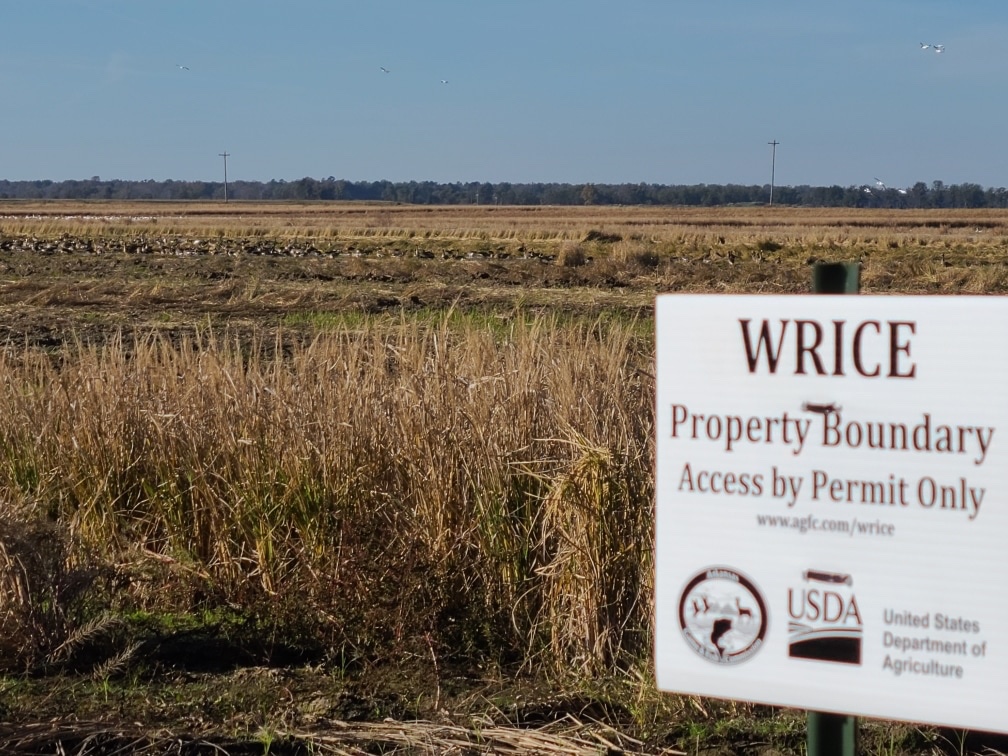Duck hunters will find a significant boost in acreage and fields available this season for private rice field hunting through the Arkansas Game and Fish Commission’s Waterfowl Rice Incentive Conservation Enhancement program. The number of fields available for drawn permits with WRICE has increased from 69 last season to 78 this year, and the acreage of private rice fields jumped from 5,015 in 2022-23 to 5,582 acres this season, according to David Graves, an AGFC private lands biologist and coordinator of the program.
Including Wetland Reserve Easement acreage, including an area in White County that will provide two permitted fields, and an entire WRE in Lawrence County that will be first-come, first-served for all hunting, the total acreage available is 6,333 acres, Graves said.
This year, along with the many fields stretched across the Delta from the northeast to the southeastern proportion of Arkansas, Graves said, “We expanded more into the Arkansas River Valley. We have two new landowners over there adding somewhere around 400 acres. We added quite a bit more opportunity in the River Valley, the area from (Interstate) 40 going from Little Rock to Conway and further west.”
All that’s standing in the way of all that acreage being available for hunting by opening day, Nov. 18, is the availability of water to flood the fields.
“The only hiccup is it’s been so dry,” Graves said. “Surface water may be hard to come by early in the season. I have had good reports (this week), and most of our landowners are in the process of pumping fields up. We’re hoping to have them available for this first weekend.”
Graves said only fields that have enough water to hunt will be made available for permits until conditions favor adding the remaining permitted fields.
The WRICE permit draw application period for the first weekend will run from 3 p.m. Thursday, Nov. 9, to midnight Sunday, Nov. 12. The cost to apply for a permit is $5. Winners will be selected Nov. 13 and notified that day. Winners of permits may bring three guests on their hunts (the permit winner must be present if the group is hunting), and the hunting parties may hunt both weekend days from 30 minutes before sunrise until sunset.
The format continues throughout the season. Those seeking a WRICE permit should plan to apply the week before the available hunt. Each application period starts at 3 p.m. Thursday, nine days before that selection’s hunt.

The three segments of the Arkansas waterfowl season are Nov. 18-26, Dec. 9-23 and Dec. 27-Jan. 31. Youths may also apply for an available WRICE permitted field on the scheduled special youth hunts of Dec. 2 and Feb. 3.
To apply for a WRICE permit, visit the newly updated agency website, agfc.com, click on the “Buy Your 2023 Hunting License” tag and then the “Special Permit Hunts” tag. More information is available at https://www.agfc.com/education/arkansas-waterfowl-rice-program-wrice/.
The application period for permits required for certain WMAs (Steve N. Wilson Raft Creek Bottoms, Cypress Bayou WMA Red Cut Slough, Sheffield Nelson Dagmar WMA Conway George Tract youth blinds, and Freddie Black Choctaw Island WMA West Unit youth hunts) also begins Thursday, Nov. 9, and runs through midnight Sunday, Nov. 12. Visit https://www.agfc.com/hunting/waterfowl/special-waterfowl-permit-hunts/ for information and links to applying.
The WRICE program, now in its sixth year, has been funded through a Voluntary Public Access grant through the Natural Resources Conservation Service, in which landowners are paid for maintaining acres for habitat suitable for migratory waterfowl, and in turn allowing public access on their private property. The program was popular with hunters in the Western United States, Graves said. Luke Naylor, formerly the waterfowl program coordinator and now chief of the Wildlife Management Division, worked with the NCRS to bring VPA funds to Arkansas after the program had been funded by the AGFC for its first two years.
Graves said landowners agree to postpone post-harvest tillage of their rice fields and do no disking. They can roll their fields, burn them or leave the rice stubble standing. Then they hold water in the fields during the season, striving for 4-18 inches of water across the field. Most fields have either pits or skid blinds, Graves said, and the blinds have been brushed. “Everything is ready,” he said. Fields without blinds offer areas of cover. Some select fields allow ATV access. This information is available on the agency’s WRICE webpage and also made available to winners of the weekly permits.
Scouting of fields is permitted before the hunt as long as the permit holders stay on the state or county roads in the vicinity of the fields, or if they use the designated parking areas.
Graves said the WRICE program offers rice field landowners a good, profitable alternative to leasing to outside parties.

“Depending on who you talk to, our lease payments are very good; they are competitive from what landowners may get from private lease holders,” he said. “The big benefit of leasing fields through our program is that those leased fields are only hunted two days a week. The remainder of the week it’s a rest area. We’re not shooting the ducks off the property, they are able to stay around there. Some of the landowners were worried about leasing to someone for all 60 days because it can drive waterfowl out of the area with a lot of hunting pressure.
Buck Jackson, the AGFC’s state wetlands coordinator, and other AGFC staff under Jackson have been a big help with the program, as has Ducks Unlimited, Graves said. “Before hunting season, we go out and maintain the blinds and brush them in after purchasing the blind material. Besides agency personnel, we have a few volunteers that also help.”
Graves has one request from permit winners. “Treat the fields as if they’re yours, but remember they are someone else’s. Pick up after yourself. Don’t tear or rut it up. Good luck as far as hunting goes.”
